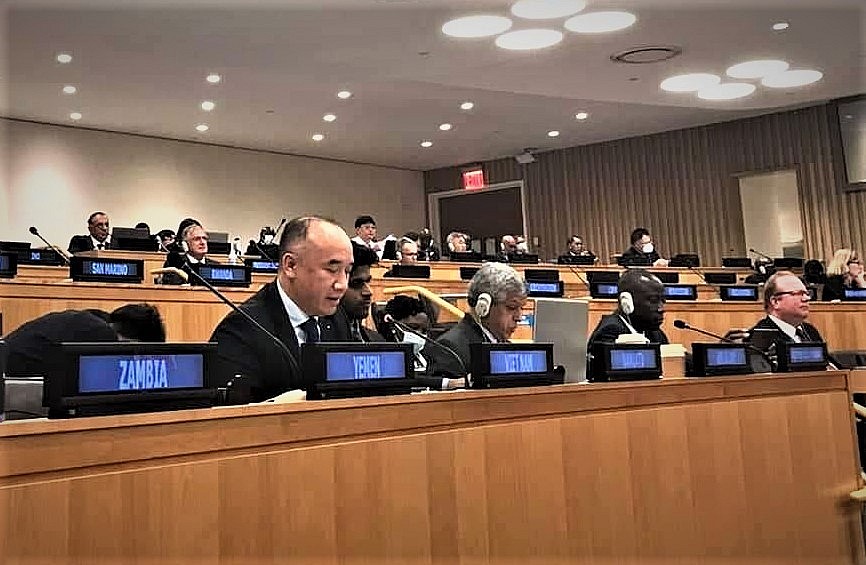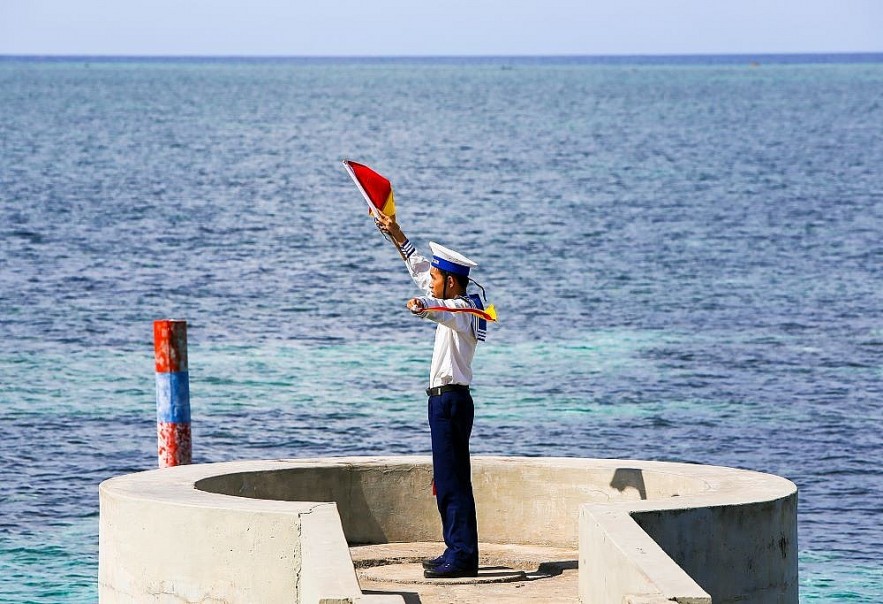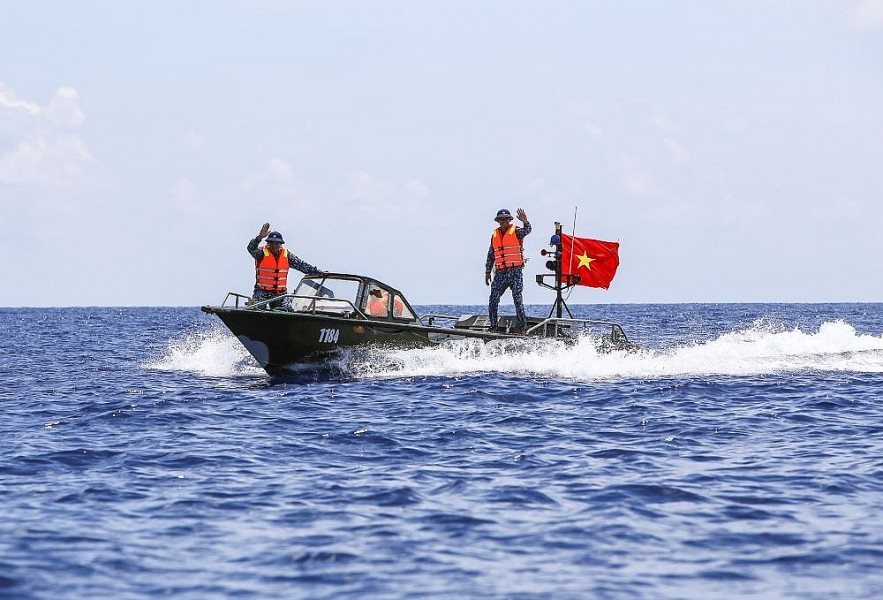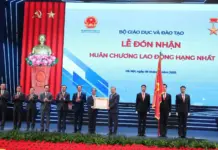 |
| Nguyen Manh Dong, vice chairman of the National Boundary Commission, Ministry of Foreign Affairs during his business trip to attend the Conference on UNCLOS 1982 taking place from June 13-17, 2022 in New York, USA. Photo: National Boundary Commission |
Can you tell us about Vietnam’s participation and contribution to the process of formulating and ratifying the United Nations Convention on the Law of the Sea 1982 (UNCLOS)?
For a long time, the international community has wanted and made efforts to build a legal order at sea, in which the exploitation and use of the sea, the legal status of the seas, the rights of all nations to the sea and oceans are clearly regulated.
This desire and effort has been realized through several international conferences on the Law of the Sea within the framework of the League of Nations and the United Nations.
These include: The Hague Conference for the Codification of International Law (1930) in the Netherlands. At this Conference, the Law of the Sea, more specifically the issue of the legal status of the territorial sea, was one of the three main topics discussed by the participating countries.
However, the Conference could not reach consensus on the issue of the breadth of the territorial sea because the views of the participating countries were too different.
The first United Nations Conference on the Law of the Sea was held in Geneva in 1958.
The biggest achievement of the Conference was the adoption of the first four Conventions on the Law of the Sea, creating a legal basis for the regulation of activities related to the seas and oceans, which are: Convention on the Territorial Sea and the Contiguous Zone; Convention on the Continental Shelf; Convention on the High Seas; and Convention on Fishing and Conservation of the Living Resources of the High Seas.
The Conference also adopted the Optional Protocol of Signature regarding the Compulsory Settlement of Disputes; The Second UN Conference on the Law of the Sea 1960. However, this Conference did not achieve any concrete results.
Unlike previous conferences, the Third UN Law of the Sea Conference took place in a new context, where a series of countries in Asia and Africa gained independence, became members of the international community and the United Nations in the 1960s.
Most of these countries have not been able to participate in previous Conferences on the Law of the Sea. Therefore, they want an opportunity to work with the international community to develop a new Convention on the Law of the Sea in which the interests and aspirations of these countries are fully recognized and reflected.
The level of science and technology is also increasingly advanced.
Humans not only find in the sea food sources but also other invaluable resources, especially oil and gas, to meet the needs of development. The Convention on the Law of the Sea – Constitution of the oceans and seas, is the result of the third Conference on the Law of the Sea.
Due to the condition that the country was temporarily divided, we were not able to participate in the preparation process (from 1967-1973) and the first phase of the third Conference on the Law of the Sea (1973-1976). According to the documents of the Legal and Treaty Department – Ministry of Foreign Affairs, we began to participate at the sixth session (1977).
With the efforts of the participating members, the Vietnamese delegation has both learned and grasped the beneficial aspects for each group of countries.
They have both formulated and promoted Vietnam’s legal position as a coastal state on a series of issues such as: the status of territorial waters and innocent passage, the regulation of baselines, the legal regime of the exclusive economic zone, the freedom of navigation, the outer limits of the continental shelf and marine economic strategy.
The biggest contribution of our delegation was that they joined with other countries to support the principle of fair maritime delimitation, which was later formalized in Articles 74 and 83 of the Convention. They supported the breadth of the territorial sea of 12 nautical miles and the legal regime of the Exclusive Economic Zone.
During the session, our delegation repeatedly voiced affirmation of Vietnam’s sovereignty over the two archipelagos of Hoang Sa (Paracel) and Truong Sa (Spratly) at the Conference.
What do you think about Vietnam’s achievements when joining the Convention on the Law of the Sea?
I think Vietnam’s achievements when joining the Convention are reflected in the following aspects:
Firstly, develop and perfect policies and laws on the sea to serve as the basis for the exercise of sovereignty, sovereign rights, management and sustainable exploitation and use of the sea.
Vietnam promptly proposed to the Government to have the Declaration on the territorial sea, contiguous zone, the exclusive economic zone and the continental shelf of Vietnam (May 12, 1977), Statement on the Territorial Sea Baseline (November 12, 1982). They have laid the foundation for the management and enforcement of our rights and interests at sea.
Vietnam has formed many consistent guidelines and policies on sea and islands. These include Politburo documents such as Resolution No. 03-NQ/TW in 1993 on a number of tasks for marine economic development, Directive No. 20-CT/TW of 1997 on promoting marine economic development towards industrialization and modernization and Resolution 09-NQ/TW 2007 on Vietnam’s marine strategy to 2020.
 |
| The sea is a space where people are responsible for preserving and protecting. Photo: Nguyen Hong |
Second, raise awareness about the role of sea and islands in the cause of national construction and defense, and the sustainable exploitation and use of seas and oceans. During the process of participating in the formulation and implementation of the Convention, the awareness of sectors and levels about the sea has changed markedly.
Accordingly, seas and oceans are not only objects of exploitation, but also objects of protection and sustainable use. The sea is not only a geographical space but also a survival space of the nation, where people are responsible for preserving and protecting.
Third, settle disputes related to maritime delimitation, creating a solid international legal basis for the enforcement of our State’s rights in Vietnam’s waters. Based on the principles of the Convention, we have successfully resolved the issue of delimitation of the overlapping sea area with Thailand (in 1997), the delimitation of the Gulf of Tonkin with China (2000), delimitation of the continental shelf with Indonesia (in 2003); joint exploitation with Malaysia (1992).
Vietnam promptly fights against any violations of the country’s sovereignty, sovereign rights and jurisdiction in the South China Sea area. Vietnam raises a common voice on issues of peace, security and stability in the South China Sea region in regional, multilateral and global mechanisms; participates in the development of international law relating to seas and oceans at regional and global scale.
Fourth, improve the institution of sea and island management through the formation of law enforcement forces at sea, enhance the roles and responsibilities of the Border Guard and the Navy.
Vietnam combines state management of seas and islands with the development of quality human resources to meet the requirements of managing and protecting sovereignty over sea and islands.
Vietnam provides formal training for forces in charge of managing and protecting sea and islands.
Many training courses on state management, sea and island, legal knowledge have also been held in ministries, branches and localities.
 |
| Vietnam has gradually enhanced the role and responsibility of the Border Guard and Navy. Photo: Nguyen Hong |
What is the role of the Ministry of Foreign Affairs in the process of joining this Convention?
In this process, as the agency assigned to assume the responsibility for negotiating and leading the implementation of the Convention in foreign affairs, the Ministry of Foreign Affairs has performed well its pioneering role.
The Ministry has advised the Party and State in transforming the provisions of the Convention into relevant legal provisions such as the Government Declaration in 1977, 1982.
The Ministry also presides over the drafting for the National Assembly to approve the 2012 Law of the Sea of Vietnam, guidelines and policies to handle issues related to the South China Sea.
The Ministry of Foreign Affairs has presided over negotiations on maritime delimitation with countries, the external struggle against violations of our sea and islands defined in accordance with the provisions of the Convention on the Law of the Sea.
Not only participating in the drafting process, Vietnam also adopted practice to implement the Convention on the Law of the Sea, enriched the contents of the Convention.
The Convention is also a solid legal foundation for Vietnam to protect national interests in the South China Sea, handle the relationship between protecting sovereignty, territorial integrity and maintaining peace and stability.
Painting contest held for buffaloes joining ploughing festival in Ha Nam
A buffalo painting contest for the Doi Son Tich Dien (ploughing) Festivalwas held on February 10, or the sixth day of the Lunar New Year in Doi Son commune, Duy Tien district, the northern province of Ha Nam.








